The maximum size of a string literal is 32K in PL/SQL. You're trying to assign a 98K+ literal, which is what is causing the error (although since that refers to 4k, that seems to be from a plain SQL call rather than the PL/SQL block you showed). It isn't getting as far as trying to create the sdo_geometry object from the CLOB.
Ideally you'd load the value from a file or some other mechanism that presents you with the complete CLOB. If you have to treat it as a literal you'd have to manually split it up into chunks; at least 4 with this value if you make them large:
declare
str clob;
begin
dbms_lob.createtemporary(str, false);
dbms_lob.append(str, 'POLYGON ((-47.674240062208945 -2.8066454423517624, -47.674313162 -2.8066509996, <...snip...>');
dbms_lob.append(str, '47.6753521374 -2.8067875453, -47.6752566506 -2.8067787567, -47.6752552377 -2.8067785117, <...snip...>');
dbms_lob.append(str, '-47.658134547 -2.8044846153, -47.6581360233 -2.8044849964, -47.6581811229 -2.8044926289, <...snip...>');
dbms_lob.append(str, '-47.6717079633 -2.8057792966, -47.6717079859 -2.80577931, -47.6717083252 -2.8057795101, -47.6718125136 -2.8058408619, -47.6719547186 -2.8059291721, -47.6719573483 -2.8059307844, -47.6719575243 -2.8059308908, -47.6719601722 -2.8059324729, -47.6720975574 -2.8060134925, -47.6721015308 -2.8060157903, -47.6721017969 -2.8060159412, -47.6721058088 -2.806018171, -47.6721847946 -2.8060611947, -47.6721897923 -2.8060650985, -47.6722059263 -2.8060767675, -47.6722070291 -2.8060775047, -47.6722416572 -2.8060971165, -47.6722428566 -2.8060976832, -47.6722611616 -2.8061055189, -47.6722666301 -2.8061076243, -47.6722849174 -2.806116847, -47.6722862515 -2.8061174528, -47.6723066339 -2.8061257231, -47.6723316499 -2.8061347029, -47.6723426416 -2.8061383836, -47.6723433793 -2.8061386131, -47.672354519 -2.8061418177, -47.6723803034 -2.8061486384, -47.6725084039 -2.8061908942, -47.6725130545 -2.8061923817, -47.6725133654 -2.806192478, -47.6725180423 -2.806193881, -47.6728423039 -2.8062879629, -47.6728698649 -2.8062995965, -47.6728952856 -2.8063088527, -47.672897007 -2.8063093833, -47.672949984 -2.8063200428, -47.6729517767 -2.8063202193, -47.672966443 -2.8063209226, -47.6729679855 -2.8063213223, -47.6733393514 -2.8064196858, -47.6733738728 -2.8064264543, -47.6733761939 -2.8064267537, -47.6733804796 -2.8064270239, -47.6733890639 -2.806431641, -47.6734057692 -2.8064398944, -47.6734069006 -2.8064404055, -47.6734241363 -2.8064474849, -47.6736663052 -2.8065373005, -47.6736676833 -2.8065378073, -47.6736677752 -2.8065378409, -47.673669156 -2.8065383402, -47.6737754465 -2.8065764489, -47.673793217 -2.8065850801, -47.6737945765 -2.8065856723, -47.6738366895 -2.8066000123, -47.6738381279 -2.8066003728, -47.6738811819 -2.8066074503, -47.6739137725 -2.8066153813, -47.6739159177 -2.806615636, -47.6739318345 -2.8066165588, -47.673951326 -2.806622013, -47.6739530661 -2.8066223195, -47.6739793945 -2.8066256302, -47.6740948445 -2.8066344025, -47.674240062208945 -2.8066454423517624))');
INSERT INTO TEMP_TEST_GEOMETRY
VALUES (SDO_CS.TRANSFORM (SDO_GEOMETRY (str, 4674), 1000205));
dbms_lob.freetemporary(str);
end;
/
You can make the chunks smaller and have many more appends, which may be more manageable in some respects, but is more work to set up. It's still painful to do manually though, so this is probably a last resort if you can't get the value some other way.
If the string is coming from an an HTTP call you can read the response in chunks and convert it into a CLOB as you read it in much the same way, using dbms_lob.append. Exactly how depends on the mechanism you're using to currently get the response. Also worth noting that Oracle 12c has built-in JSON handling; in earlier versions you may be able to use the third-party PL/JSON module, which seems to handle CLOBs.
